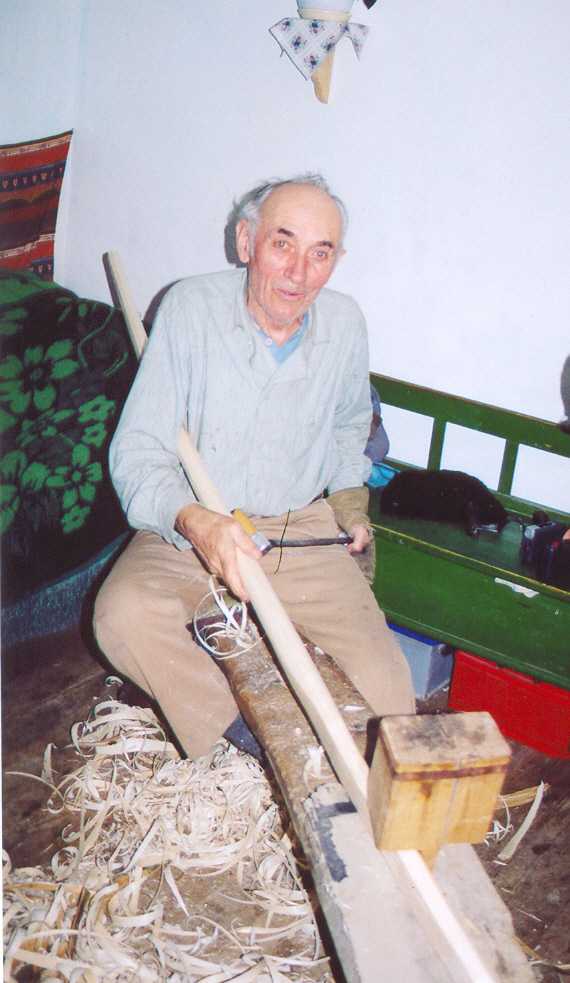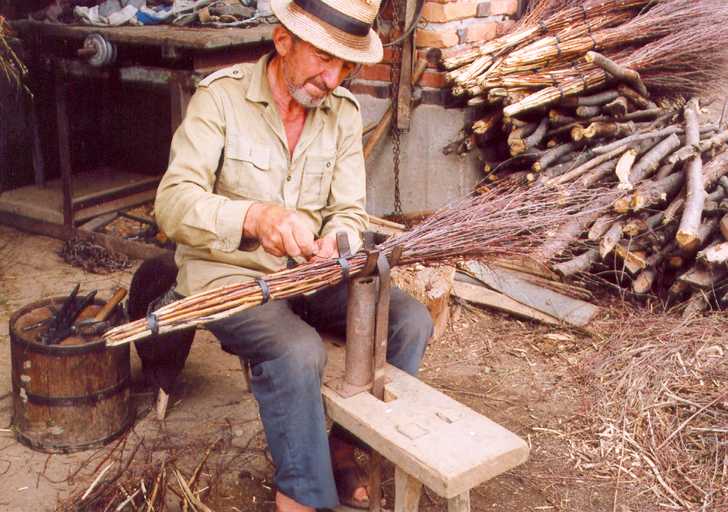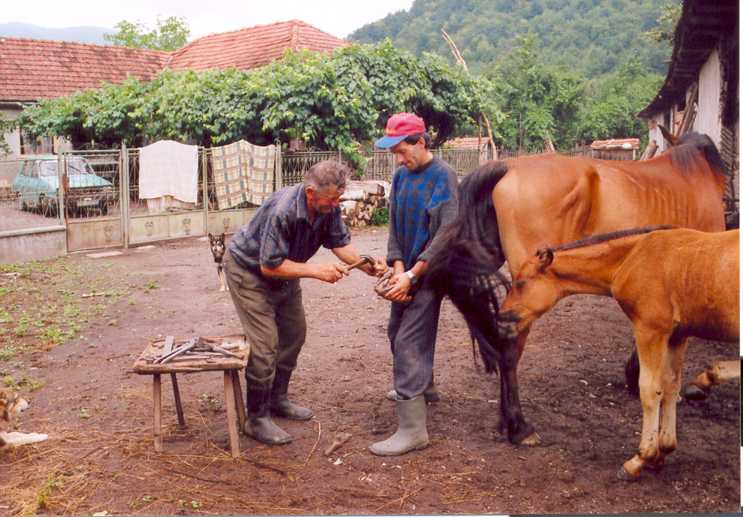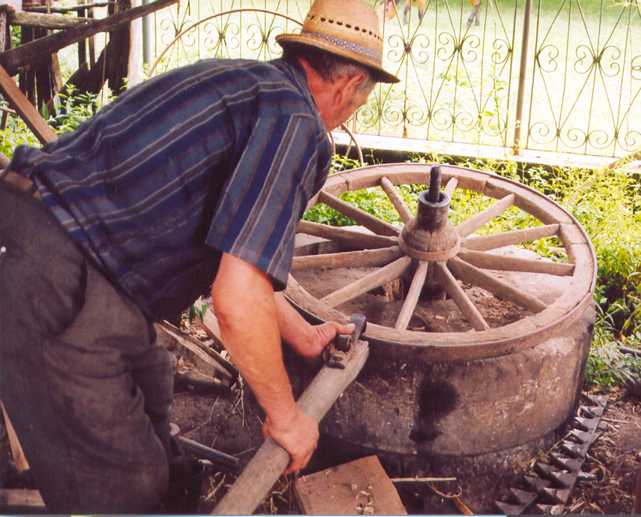 |
||||||||||||||||
|
Project financed by |
||||||||||||||||
|
|
||||||||||||||||
 |
|||
|
The trades appeared just like everywhere in the world, they were influenced by the raw material, by the fairs and in special occasions (Totkomlos, Pecica, Peregu Mare, Turnu, Elek) the trades were brought by some minorities (slovaks, germans, serbians) when the colonization was made. In the localities from the field area (Pecica, Turnu, Peregu Mare, Totkomlos, Elek, Micherechi) the traditional trades almost disapeared because of the industrialization wich developed very fast. At the same time in the mountain area (Vidra, Avram Iancu, Magulicea) the traditional trades were very well preserved. Avram Iancu A very known trade in this village is wooden forks making a trade that gives a good name to the village. The wooden forks are used for gathering the hay. The wooden forks are made of ash trees. They are processed, carved and cut with special tools. In order to obtain a straight handle and bent arms for a wooden fork, the wooden forks must be boiled, put on a special support and kept for a few days in a room with much smoke. The last and the most important part of the whole process is when the wooden forks are straightened., they could be torn if you are not carefuly enough. The wooden forks are then sold in the fairs of Transilvania and Apuseni Mountains. In the past they were sold even in the fairs of Hungary. Another important trades in this village Avram Iancu are the manufacture of brooms and objects made of twigs. The twigs are from weeping willow or osier and beautiful baskets of all sizes are made of them. In Avram Iancu there also is a forge and the smith is also making wooden wheels (nr. 109 – Miclanesti part). Miclean Pavel, the smith maufactured more than 170 wooden waggons with all the wood and iron accessories. An old trade that disappeared nowadays was the work in a guarry. In Avram Iancu also was a shoes work shop. Vidra In this village people are manufacturing twig brooms and wattles. On special occasions (the 1st of March and the 8th of March) they are manufacturing little twig baskets for the spring flowers (snowdrops, crocuses, violets) and they sell them in the fairs. In Vidra there are two kilns for making lime. One of them is working but the other is ruinedined. The kilns stopped working two years ago because there was no raw materials. Magulicea In this village, Neag Gheorghe (nr. 88) is manufactuering wooden forks. He brought the trade in Magulicea from his birth village Avram Iancu. He works with ancient methods. He prefers to carve with his hand the wooden forks handle. Gheorghe Ghilea (aged 78) is the skilledest house maker in the village. He built o lot of houses, stables. He is very skilled with the technique of wooden pillars combining. He also bilds houses of brick. In the village there also is a forge. Pecica In pecica there is a forge at nr. 2055 – the smith Bara Liviu. The forge is very known in the area. People from Peregu Mare village are coming to Pecica with their horses to be shoed. Another well known craftsman in the locality is Laza Ioan. He is manufactuering twig baskets, flowers twig supports, twig furniture etc. He has his own osier plantation and his own workshop where the osier is processed in the ecological conditions. He is very known abroad. This locality was in the past very known for its craftsmen who were organized in associations. There were associations of sheepskin coat makers, shoe-makers, iron smiths, wheel-makers, weawers. Micherechi The inhabitants of this village are cultivating cucumbers and paprikas in the green houses. It is a very profitable affair. The old trades were abandoned (the forges, twig brooms making, bulrush kniting – a very spred trade in the locality). Elek (Aletea) In this village Gheorghe Baghy is still practising the stone corving. He is the craftsman that makes the cosses in the grave yard. He learnt the trade from somebody who lives in Gyula. Other traditional trades are not kept. Peregu Mare The inhabitans from this village are very old. More than 60% are retired. Most of the inhabitants moved in Arad and there are more than 100 empty houses. The old trades are not practised anymore. The forge is not working anymore so that the people are going to Pecica ( the nearest forge) to shoe their horses. Totkomlos In the middle of the XVIII th century in Totkomlos are colonized 80 slovak families. They brought with them their trades and continued to practise those trades in Totkomlos. There were a lot of carpenters, well known in the area for their work. There also were wooden wheels workshops and wooden wagoons workshops. In Totkomlos there was a sheepskin coat workshop and a shoes workshop. In the locality there was a pottery center very well known in the area for the beautiful work of the potters. They are manufactuering plates, decanters but most of all big pots. To sell their pottery the potters were going in the area field and in Arad town. At the begining of the 1970 the inhabitants were no longer working pottery. Nowadays in Totkomlos there is a sheepskin coat workshop and the pottery is made only in one single workshop.The specific colour of Totkomlos pottery was green. Turnu In the past in Turnu was a forge , a shoes workshop and a wooden wheels workshop. In the wooden wheels workshop were made even wooden waggons. In Turnu there also was a craftsman specialized in house building. Nowadays those trades are not kept anymore. |
|||
|
[Home] [About the project] [Research in Romania] [Research in Hungary] [Architecture] [Trades] [Storytellers] [Multimedia] [Contact] |
 Very much importance was granted in this research to the traditional trades found in those localities included in the project.
Very much importance was granted in this research to the traditional trades found in those localities included in the project.


